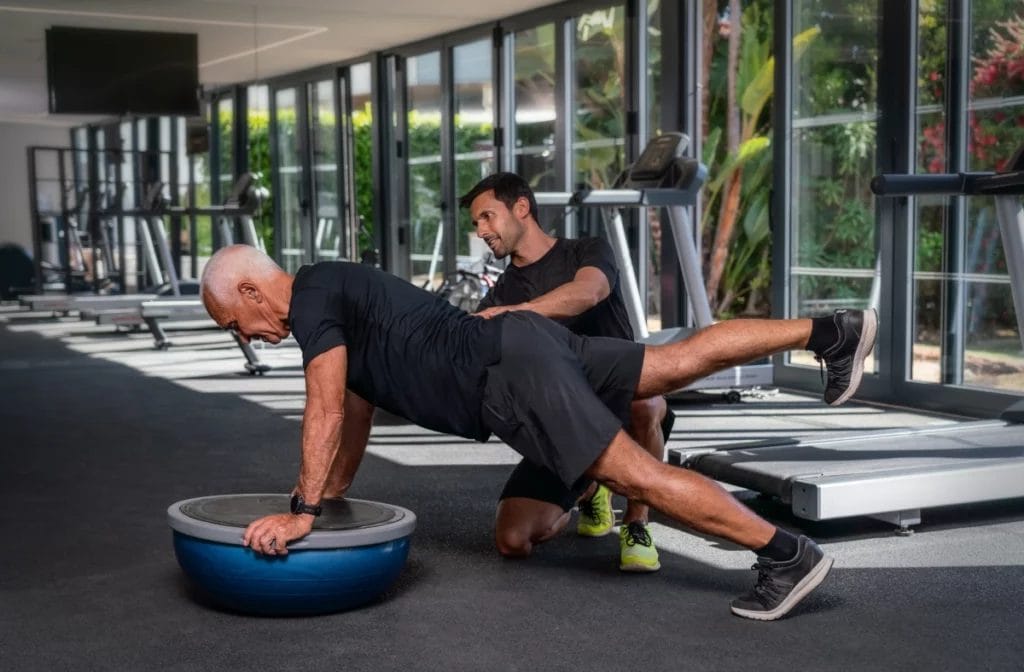Personal trainer liability insurance is your professional parachute, designed to shield you from financial ruin due to client injuries, accidents, and lawsuits.
If a client gets hurt, you could be held responsible for paying their medical bills. If a client sues you for negligence, you’ll still have court and lawyer fees even if you prove your innocence. Liability insurance’s job is to help pay for things like these, so you don’t end up in bankruptcy.

Why Personal Trainers Need Liability Insurance
You need liability insurance if you sell products or services to other people. Liability insurance helps pay for injuries and other harm you unintentionally cause others.
You may be the safest fitness instructor in the world, but you’re not a superhero, and accidents still happen. Fitness claims and lawsuits can range from hundreds to thousands of dollars. That’s money most personal trainers don’t have on hand.
That’s why you need personal trainer liability insurance: to protect your business and reputation in case of an accident (and to help pay for claims you can’t afford on your own). Plus, if you work in a public gym, they may require you to carry your own liability insurance.
Injuries and property damage costs: $100s to $100,000s
Insurance Canopy liability insurance: $15/month or $159/year
Your bank account: -$159/year for insurance? Or -$200 to -$200,000 for a single injury claim?

What Personal Trainer Insurance Covers
Personal trainer insurance is liability insurance designed for traditional trainers, group exercise instructors, and other fitness professionals. It covers unintentional harm you do to others. It does not cover harm to you.
Insurance Canopy policies include the following parts, each covering certain kinds of incidents.
- General liability
- Professional liability
- Personal and advertising injury
- Products-completed operations
- Damage to rented premises
- Medical expense
Canopy’s personal trainer policies also go where you go: in person, multiple gyms, online, or all the above. So your coverage doesn’t change just because you change locations.
Pro Tip: Canopy covers a variety of fitness styles. One policy covers you whether you do 1:1 personal training only or teach dozens of fitness styles.
General Liability
General liability coverage applies to bodily injury and property damage you cause others. These scenarios usually happen during your session or in the physical location you coach.
Bodily injury examples:
- A client falls and cuts their forehead, needing stitches
- A client sprains a hamstring during walking lunges
- A client suffers an asthma attack after you pushed them too hard, and they need medical attention
Property damage examples:
- You crack a client’s phone screen after accidentally dropping a dumbbell on it
- A client accidentally hits and cracks a mirror with a barbell while setting up
Pro Tip: Some companies sell professional liability insurance separately from general liability. Insurance Canopy includes both professional and general liability in our base instructor policy.
Professional Liability
Professional liability insurance is also called Errors & Omissions (E&O) Insurance. It applies to injury or damage caused by your professional services, advice, or instructions. It also applies to the lack of proper instruction (aka negligence).
These damages may be real or perceived, happen after a training session, or occur while a client is working on their own. However, you’re still blamed for causing them.
Examples:
- A client sustains an injury after performing a barbell squat the way you instructed in a pre-recorded video
- A client claims you were negligent after they fall and break an arm while you were talking to another trainer
- A client sues you after guaranteeing they’d lose 20 pounds in six weeks on your program, but they only lost five
Pro Tip: Dive deeper into the differences between general and professional liability insurance for fitness professionals.
Personal and Advertising Injury
Personal and advertising injury insurance applies to harm or damage that is not physical. This typically means things like invasion of privacy, defamation, and copyright infringement.
Insurance Canopy includes this coverage under general liability (meaning you don’t need to buy it separately).
Examples:
- You share a client’s transformation video on social media without their consent
- Another trainer accuses you of stealing their business name
- You’re accused of defamation after talking negatively about a specific gym on social media

Products-Completed Operations
Products-completed operations coverage applies to physical injury or property damage caused by a product you provide or sell during or after your training session.
Examples:
- A faulty resistance band snaps and scratches a client’s eye after class
- You sell training programs in ebook form online and a buyer tears a muscle performing a poorly-described exercise
- A client experiences a severe allergic reaction to a sore muscle balm you applied to their shoulder after a workout
Damage to Rented Premises
Rented premises coverage is for damage to a space you rent to work in. If you rent a space for over seven days, this coverage applies to fire damage. If you rent the space for seven days or less, it covers damage regardless of cause.
Examples:
- You rent a shared gym space by the hour and a client loses their grip on a kettlebell, denting the wall
- You rent a shared gym by the month to train all your clients, and when you plug your phone in to charge, the outlet sparks and causes a small electrical fire
Medical Expense
Medical expense coverage applies to smaller medical bills of someone injured in or around your class, regardless of fault.
Examples:
- In a small group session, one client accidentally knocks over another, resulting in a sprained knee
- A client drops a dumbbell on another gymgoer’s foot during your session and breaks that person’s toe
Optional Coverage Add-Ons
In addition to the above coverages, which are all included in Canopy’s base personal trainer policy, you can include several types of extra coverage.
- Gear & Equipment Coverage: Also known as inland marine insurance, this coverage applies to the gear you own and use for work in case something is broken or stolen
- Cyber Liability Coverage: Coverage that helps with the consequences of data breaches and other cybercrimes, like the cost of recovering and restoring client data
- Diet & Nutrition Coverage: Coverage for nutrition-related services you may provide
- Sexual Abuse and Molestation Coverage (SAM): Coverage for defense costs if you’re wrongly accused of sexual harassment or improper conduct
- Additional Insureds: When a gym owner, landlord, or other business entity asks to be added to your insurance, you list them on your policy as an additional insured
Get Personal Trainer Insurance Online
Getting personal trainer insurance is quick and easy with Insurance Canopy’s online checkout process.
- Go to the checkout page and select “personal trainer”
- Opt in or out of additional coverages
- Provide some basic business information
- Choose your policy start date and review your coverage choices
- Choose annual or monthly payments and input payment info
A few seconds after processing payment, you’ll receive an email confirmation and instant access to your certificate of insurance through your online dashboard. You may also update and manage your policy via the dashboard anytime.

Frequently Asked Questions About Personal Trainer Insurance
How Much Does Personal Trainer Liability Insurance Cost?
Personal trainer insurance from Insurance Canopy costs $15/month or $159/year.
Add-on coverages cost:
- Gear and equipment: $1.33–$10.67/month
- Cyber liability: $8.25/month
- Diet and nutrition: $6.83/month
- Sexual Abuse and Molestation (SAM): $10.33–$14.46/month
- Additional insureds: $15/year for one or $30/year for unlimited
What Is the Difference Between General Liability and Professional Liability Insurance for Personal Trainers?
The main difference between general and professional liability insurance is their scope of coverage, or the circumstances where they apply.
General liability covers things like injuries, trips, and falls that occur due to your regular business operations. Professional liability covers more abstract circumstances like negligence, mistakes, inaccurate advice, or clients’ unmet expectations.





